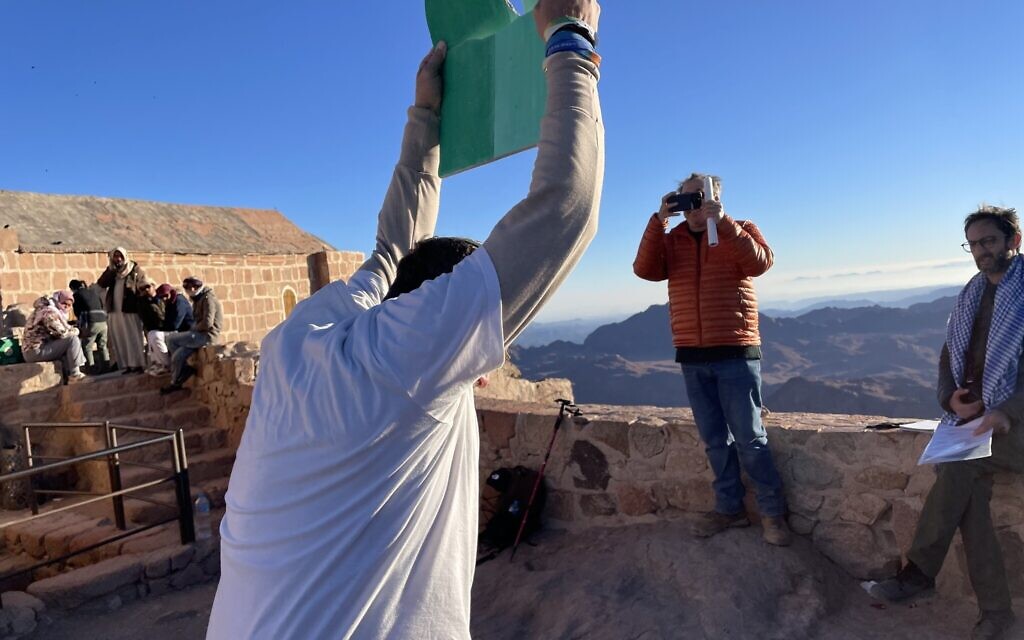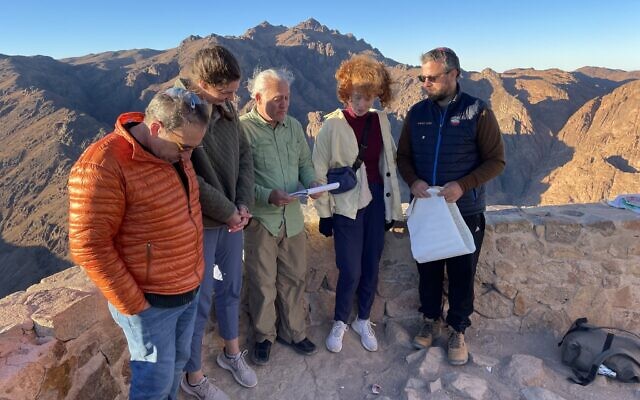A New “god” for Those Who Don’t Truly Know the One True God – Many Religions Agree to Worship a New “god”

Yosef Abramowitz smashes tablets atop Jebel Musa in Egypt, thought by some to be the site of Mount Sinai, to symbolize the world’s lack of action on climate change, November 13, 2022. (Sue Surkes/Times of Israel)
JEBEL MUSA, Egypt — An initiative to mobilize faith leaders worldwide to push governments to do more about climate change kicked off Sunday morning with an Israeli environmental activist smashing mock tablets of stone atop an Egyptian peak believed by many to be Mount Sinai, to symbolize the world’s failure to protect the planet.
The idea was hatched in the run up to the United Nations COP27 climate conference taking place in the Egyptian resort of Sharm el-Sheikh, by solar energy entrepreneur Yosef Abramowitz and David Miron Wapner, who chairs the Jerusalem-based Interfaith Center for Sustainable Development.
The Sinai Climate Partnership, symbolically launched at the ceremony, brings together the Interfaith Center for Sustainable Development, the Elijah Interfaith Institute, the Peace Department, the United Nations Faith for Earth Initiative, Abramowitz’s Gigawatt Global, and the Israeli environmental advocacy organization, Adam Teva V’Din.
After sunrise, Abramowitz and Wapner gathered at the summit together with Nigel Savage, the founder and former director of the US Jewish environmental organization Hazon, and his successor Jakir Manela, to read sections the Holy Land Declaration on Climate Change signed in 2011 by the multifaith Council of Religious Leaders of the Holy Land. Two teens from the US, there as part of Christian Climate Observers, joined the ceremony as well.
After the group read from a new draft list of “Ten Principles for Climate Repentance,” formulated by dozens of multifaith leaders meeting in London over the past few days, Abramowitz smashed two tablets on the ground.
Get The Times of Israel’s Daily Editionby email and never miss our top storiesNewsletter email addressGET IT
By signing up, you agree to the terms
The act was a symbolic echo of the Bible’s Moses smashing the 10 Commandments in protest against the Israelites, after descending Mount Sinai.
“We look down to Sharm el-Sheikh and we’re not satisfied,” Abramowitz said as he smashed a tablet.
From left: Nigel Savage of Hazon, Anneka from the US Christian Climate Observers, David Miron Wapner of the Interfaith Center for Sustainable Development, Elsa from Christian Climate Observers, and Jakir Manela of Hazon launch the Sinai Climate Partnership from Jebel Musa, Egypt, on November 13, 2022. . (Sue Surkes/ Times of Israel)
One of the tablets was made by youth from the Israeli branch of Strike 4 Future, painted with the words “Broken Promises” in Hebrew. The other tablet was painted green, to symbolize the “green commandments,” Abramowitz said.
“The political leadership of the world has not come through on climate until now, ” he said. “It’s the 27th gathering of world leaders, and things are just getting worse. We are calling on faith leaders to add to the sense of urgency and to have them weigh in, hopefully forcefully and globally, to push for the reduction by 50 percent, at least, of global warming emissions by 2030. Reducing emissions so gradually is immoral at this point.”
James Sternlicht, head of The Peace Department, called on faith leaders to take a climate vow: “I, as a person of hope, pledge to make the world a better place for people and planet, each day that I may live.”
“Today, as faiths put aside their differences in a common call for climate action, we work towards a new covenant for mankind in the name of the protection of our common home and for the betterment of our shared human future,” he said by video link from the COP27 confab.
Celine Phillips, a member of the French delegation to the UN COP27 climate negotiations in Sharm el-Sheikh, Egypt, looks at the Holy Land Declaration on the summit of Jebel Musa, Egypt, on November 13, 2022. (Sue Surkes/Times of Israel)
One immediate signatory to the climate pledge was Flora Vano, a delegation member to the COP27 confab from the small Republic of Vanuatu, an 83-island archipelago of largely coral reef atoll islands in the south Pacific.
The United Nations considers seismically active Vanuatu to be the world’s most at-risk nation when it comes to natural disasters, and these, according to Vano, are intensifying as a result of climate change. These include sea level rises, cyclones, strong storm surges, food loss because of both heavy floods and drought, and migration.
“I am a woman and a mother and a part of humanity,” she said. “I have a right to survive. ”
An IsraAid worker speaks with a local man after Cyclone Pam battered the Pacific Island nation of Vanuatu in March 2015. (IsraAID/File)
Abramowitz and Wapner’s original idea was to bring dozens of multifaith leaders to Mount Sinai for the inaugural ceremony, but Egyptian authorities refused permission, saying the time was not right.
The town of Saint Catherine, below the towering mountain, is currently a vast building site. The state is constructing new hotels and a huge center for multifaith prayer. The mountain is the most popular of several sites in Egypt, Israel and elsewhere that are traditionally associated with the biblical location of Mount Sinai, where Moses ascended to receive the Ten Commandments from God in the Old Testament.
The Monastery of St. Catherine in Egypt’s south Sinai, on April 16, 2017. (AFP/Pedro Costa Gomes/File)
Instead, the new Sinai Climate Partnership will be officially announced Sunday night from a ceremony on Parliament Hill — the highest point in London.
Ceremonies are also planned for high points in Jerusalem, Salt Lake City, Ecuador, Australia, at India’s Mount Abu in Rajasthan and in Calcutta, and at Mount St. Francis, a Catholic retreat center in Indiana.
Savage noted that Israel would soon mark 75 years since its founding, which he described as an inflection point for the nation: “That 75th anniversary, at this particular time, given everything that’s going on in the world, and with a new government coming in in Israel, is a genuinely key moment and opportunity for the State of Israel and the Jewish people to say that the next 25 years will be about responding to the climate crisis.”







